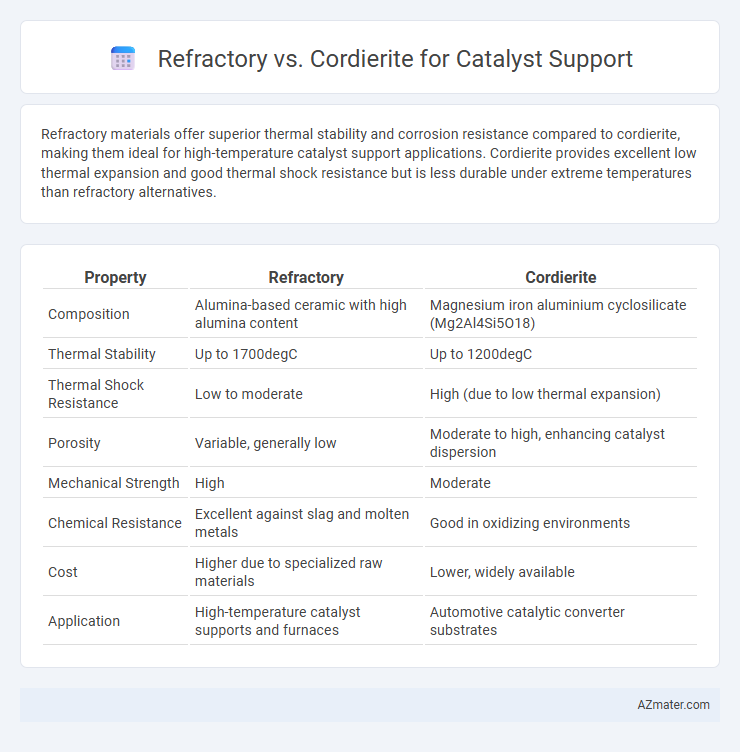Refractory materials offer superior thermal stability and corrosion resistance compared to cordierite, making them ideal for high-temperature catalyst support applications. Cordierite provides excellent low thermal expansion and good thermal shock resistance but is less durable under extreme temperatures than refractory alternatives.
Table of Comparison
| Property | Refractory | Cordierite |
|---|---|---|
| Composition | Alumina-based ceramic with high alumina content | Magnesium iron aluminium cyclosilicate (Mg2Al4Si5O18) |
| Thermal Stability | Up to 1700degC | Up to 1200degC |
| Thermal Shock Resistance | Low to moderate | High (due to low thermal expansion) |
| Porosity | Variable, generally low | Moderate to high, enhancing catalyst dispersion |
| Mechanical Strength | High | Moderate |
| Chemical Resistance | Excellent against slag and molten metals | Good in oxidizing environments |
| Cost | Higher due to specialized raw materials | Lower, widely available |
| Application | High-temperature catalyst supports and furnaces | Automotive catalytic converter substrates |
Introduction to Catalyst Support Materials
Catalyst support materials like refractory ceramics and cordierite play essential roles in enhancing catalytic efficiency and durability in automotive and industrial applications. Refractory materials offer superior thermal stability and resistance to chemical corrosion, making them ideal for high-temperature environments. Cordierite provides excellent thermal shock resistance and lightweight characteristics, which contribute to improved catalyst performance and longevity under fluctuating temperature conditions.
Overview of Refractory Materials
Refractory materials for catalyst support provide excellent thermal stability and resistance to chemical corrosion, making them essential in high-temperature industrial processes. These materials, often composed of alumina, silica, or zirconia, exhibit superior mechanical strength and thermal shock resistance compared to cordierite. Their ability to maintain structural integrity under extreme conditions ensures enhanced catalyst performance and longevity in applications such as automotive exhaust treatment and petrochemical refining.
Cordierite: Properties and Applications
Cordierite is a preferred material for catalyst supports due to its high thermal shock resistance, low thermal expansion coefficient, and excellent mechanical strength, making it ideal for withstanding extreme combustion temperatures in automotive and industrial catalytic converters. Its chemical stability under acidic and oxidative environments ensures durability and prolonged catalyst life. Applications of cordierite include use in diesel particulate filters and three-way catalytic converters, where effective heat management and structural integrity are critical.
Key Performance Indicators for Catalyst Supports
Refractory materials exhibit superior thermal stability and mechanical strength, making them ideal for catalyst supports operating under high-temperature conditions, often exceeding 1400degC, with high resistance to thermal shock and mechanical wear. Cordierite offers excellent thermal expansion properties and durability at moderate temperatures up to approximately 1200degC, providing enhanced resistance to cracking and vibration stress, which is crucial for automotive catalysts and industrial applications. Key performance indicators for catalyst supports include thermal conductivity, porosity, mechanical strength, and chemical inertness, where refractory materials typically outperform cordierite in high-temperature durability, while cordierite excels in thermal shock resistance and cost-effectiveness.
Thermal Stability: Refractory vs Cordierite
Refractory materials exhibit superior thermal stability compared to cordierite, withstanding temperatures often exceeding 1600degC without structural degradation. Cordierite, while offering good thermal shock resistance up to around 1000degC, begins to lose integrity and may crack under prolonged high-temperature exposure. This makes refractory supports ideal for catalyst applications requiring high-temperature durability and resistance to thermal cycling.
Mechanical Strength Comparison
Refractory materials generally exhibit higher mechanical strength compared to cordierite, making them more suitable for catalyst support applications in high-stress environments. Cordierite offers good thermal shock resistance but has lower fracture toughness and compressive strength than typical refractory ceramics. Mechanical strength parameters such as modulus of rupture and hardness favor refractory supports for durability under thermal cycling and mechanical load conditions.
Chemical Resistance and Reactivity
Refractory materials exhibit superior chemical resistance to high-temperature exhaust gases, maintaining structural integrity and minimizing reactions with catalytic components during automotive emission control. Cordierite, while offering excellent thermal shock resistance, shows increased reactivity under acidic or sulfur-rich environments, potentially leading to accelerated degradation of the catalyst support. Selecting refractory over cordierite enhances catalyst longevity by reducing chemical interactions that compromise active sites and support stability.
Cost and Availability Analysis
Cordierite is generally more cost-effective and widely available due to its abundance and established manufacturing processes, making it a preferred choice for catalyst supports in large-scale applications. Refractory materials, though often more expensive, offer superior thermal stability and durability, which justifies their higher cost in high-temperature industrial environments. Market demand trends and supply chain factors continuously influence the price volatility and availability of both refractory and cordierite materials.
Industrial Applications: Case Studies
Refractory materials such as alumina and silica exhibit superior thermal stability and mechanical strength, making them ideal for high-temperature industrial catalytic converters used in steel manufacturing and petrochemical refining. Cordierite supports offer excellent thermal shock resistance and lower thermal expansion, proving effective in automotive catalytic converters and small-scale chemical processing reactors. Case studies reveal that refractory supports enhance catalyst lifespan under extreme heat, while cordierite excels in applications requiring rapid temperature cycling and weight reduction.
Choosing the Optimal Catalyst Support
Selecting the optimal catalyst support involves analyzing the thermal stability and mechanical strength of refractory and cordierite materials. Refractory supports offer superior heat resistance and durability under high-temperature conditions, making them ideal for industrial processes with extreme thermal fluctuations. Cordierite provides excellent thermal shock resistance and lightweight properties, which enhance catalyst longevity in automotive applications requiring rapid temperature changes.

Infographic: Refractory vs Cordierite for Catalyst support
 azmater.com
azmater.com